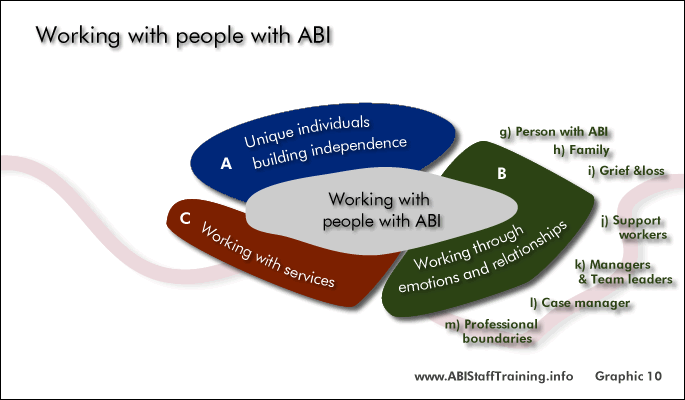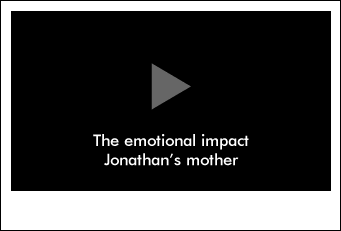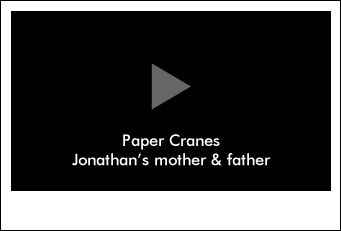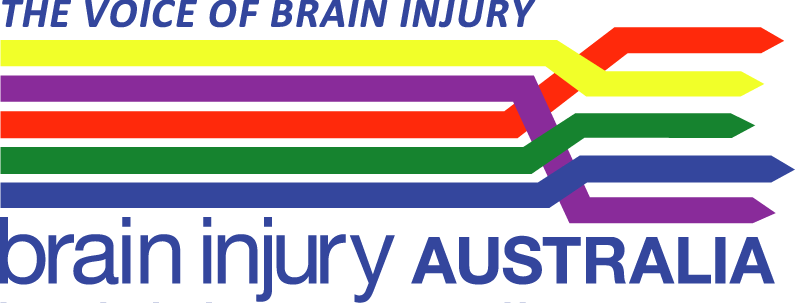- MODULE 2: Working with ABI
- Introduction
- Take the Pre-test
- A. Uniquely building independence
- a) Unique
- b) Injury-Effect-Behaviour
- c) Frontal lobe proxy
- d) Change happens
in the day to day - e) A life span view
- f) Person centred, Goal directed
- B. Through emotions and relationships
- g) Person with ABI
- h) Family members
- i) Grief and loss
- j) Support workers
- k) Managers and Team leaders
- l) Case managers
- m) Professional boundaries
- C. With services
- n) Pathways
- o) Part of a team
- p) The services network
- D. Principles and standards
- q) Principles and standards
- E. Integration
- r) Practice tools
- s) Case study
- t) Further learning
- Take the Post-test
B. Working through emotions and relationships
- i) Key messages:
Graphic - ii) Jonathan's mother:
Emotional impact: Video Q - iii) Jonathan's mother:
Paper cranes: Video Q
i) Key messages graphic

Could you use this screen to explain the key messages to somebody else?
ii) Clip14. Jonathan & Mother : The Emotional Impact (3 min 40 sec)
Jonathan's mother (&Jonathan) talking about the emotional impact of what happened
Answer the following questions
life turned upside down in a split second. And at first my husband didn’t cope terribly well and I my younger son, Chris, had to be sort of shifted from pillar to post to be looked after because I stayed with Jonathan the entire time in hospital for five months. So there was enormous strain on the family unit
I saw as probably the navigator of the ship, if you like, out of this storm and I knew that I had to really hold it together and steer us through it and I had to do that by finding things to do for each member of the family to feel like they were contributing to the program, and the program ... ... restoring what some function. We never had a complete picture, I didn’t at least in my head, of what he was going to, you know, end up. What his potential was. And I think it is wrong actually for clinicians to try and put a picture in your head of that because you know you can’t predict that. There are too many other factors that come into the rehabilitation of someone.
But the thing that pulled us through it all was coming together as a family, having Jonathan and his needs at the forefront, not seeing it as a burden, if you like becoming you know self-sacrificing I think you just have to. You can’t be selfish, you can’t say you know I have to work or I have to do this. You have to just pull together as a family unit as one and you need everything else out there working for you. You need the extended family helping and then you need the friends helping the extended family and you know, this, if you like sacred circle which even involves therapists and clinicians and it has to become a team to be successful.
iii) Clip 15. Jonathan' s Mother & Father : Paper Cranes (3 min 45 sec)
Jonathan's mother (& father) talking about the value of writing a diary and how it turned into the book Paper Cranes
Answer the following questions
I started keeping a journal in hospital, that’s how it all began and I began making daily entries of the microscopic improvements he was making as I knew I was too emotionally damaged perhaps to be able to recall all the terribly important things that happened or that doctors said and the medication that he reacted to, there were different things like that. And it then, it became important because as the weeks turned into months it gave me something to look back on to see how far he had come and it was, and for you too wasn’t it, we would get it out and say gee look at that, you know, six weeks ago he couldn’t move his toe. And now he is moving his big toe.
It was as you have heard writers use the word cathartic, I didn’t think it was at the time because I cried bucket loads of tears at having to revisit all those painful memories and feelings that I thought I had dealt with and filed away. But when I reached the final chapter there was a very calm and I felt a very strange calmness and an inner peace that I hadn’t felt for several years. It was like my frantic mind with its unrelenting quest for solutions and answers and how are we getting better. I found the answer was there all along and that it was inside of me, and it was this special place of understanding that I reached.
And of course writing it let me stand back and reflect on the enormity of what we had been through as a family and it enabled me to see that um, it just taught me to let go of the past and ah accept him for everything that he was now, this new Jonathan and the amazing person that he was now, that’s what it did for me. So it made me realise that life may not have fulfilled all our hopes and dreams but um you know it doesn’t have to, sometimes the dreams change but they can still be good.



